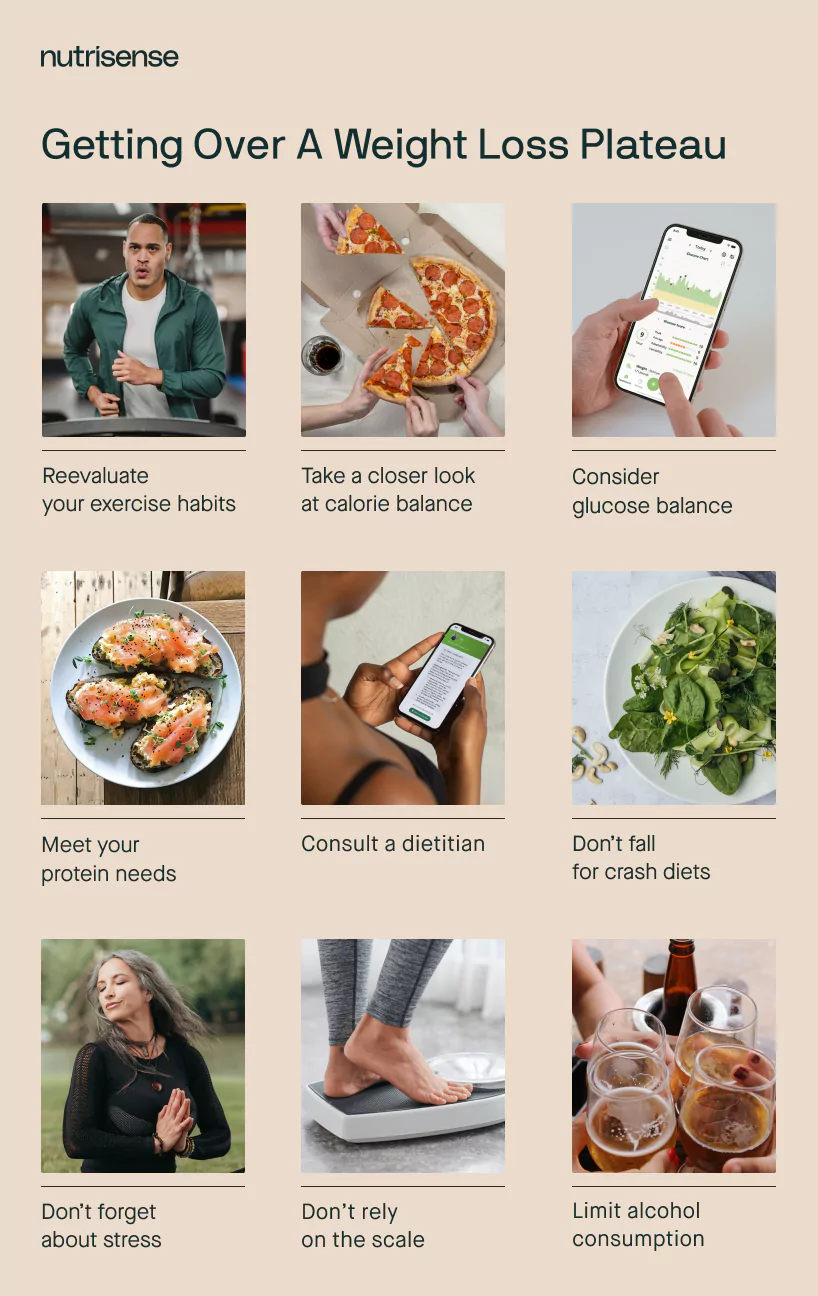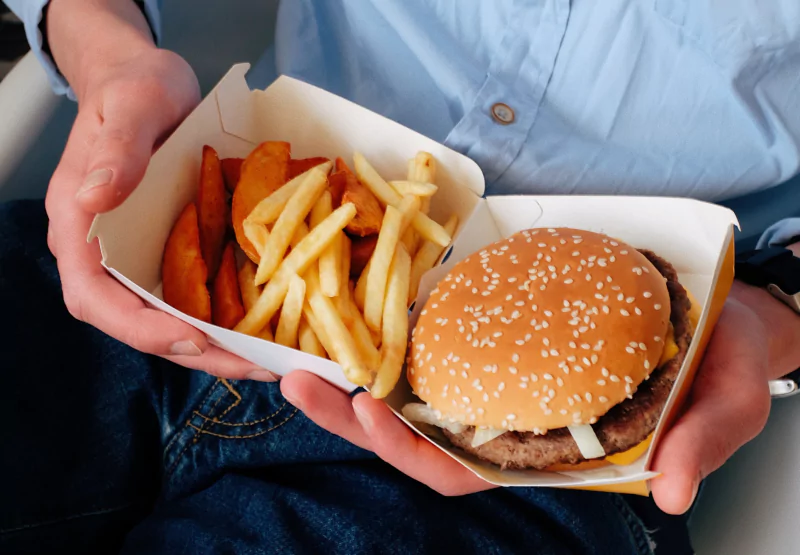How to Get Past a Weight Loss Plateau

Key Takeaways
Experiencing a weight-loss plateau is a challenge almost everyone on a weight-loss journey has faced. This type of plateau occurs when your body weight, or body fat percentage, won’t budge despite you doing all the “right things.”
You’ve been working out, eating right, and, over time, have been seeing some positive results. Then, all of a sudden, your body seems to hit a wall it can’t break through.
That’s what a weight loss plateau feels like. And it’s frustrating to say the least. You’re not alone in this frustration, but resolving the weight plateau is definitely doable.
Read on to learn about some common reasons weight plateaus happen and nine tips to overcome them with expert advice from our dietitians.
What is a weight loss plateau, and why does it happen?
A weight-loss plateau is a fancy way to describe the point at which your weight loss becomes stagnant. In our recent article on weight loss, we discussed some factors that might be preventing you from losing weight.
That Moment the Scale Won't Budge
You’ve been consistent for weeks: waking up for those early workouts, prepping your meals, and feeling good about your progress. But for the last two weeks, the number on the scale has been stuck.
You’ve tried adding another walk and being even more careful with portions, but nothing seems to make a difference. The initial confidence is turning into frustration as you start to think, "I'm doing everything right, so why isn't it working anymore?"
In order to understand why your weight loss efforts may no longer be working well for you, it’s first important to understand how weight loss works. On the most basic level, we’ve been told that the number of calories you burn needs to be higher than the number of calories you consume.
Over restriction risks
While this is true to some extent, over-restricting calories can also result in weight plateaus or even weight gain for some people. If you’ve been tracking calories and decreasing them significantly as part of your weight loss journey, it might be time to consider some other variables at play.

You can hit a weight loss plateau for a variety of reasons, and anyone who has tried following a weight loss program will know that this can be very frustrating. One theory for why these plateaus occur is called the set point theory.
Set point theory
This theory suggests that your body will try to maintain homeostasis, or balance, by bringing itself back to a certain “set” weight through shifting hormones and other functions to compensate for other changes you make in diet or exercise.
However, some have criticized the set-point theory for failing to appreciate more complex relationships between our environment and genes. A few researchers have suggested alternate explanations.
Metabolic Adaptation and Flexibility
Plateaus can reflect physiology, not failure. As body composition and intake change, the energy your body uses at rest can shift.
Two terms you may see are resting energy expenditure (REE) and adaptive thermogenesis, which describe baseline energy use and adaptive reductions reported in some weight-loss studies.
Metabolic flexibility refers to the capacity to switch between carbohydrate and fat as fuel across the day. Mitochondria in muscle and other tissues support this fuel switching. See a 2025 overview of metabolic flexibility in cardiometabolic health.
Many training and nutrition plans include routines that use more glycogen on higher-intensity days and emphasize fat oxidation during lower-intensity activity or overnight.
Apply this with Nutrisense. Use 24/7 glucose trends in the app with the guidance of a registered dietitian or nutritionist to see how meals, timing, sleep, and workouts impact your results. Test one or two changes for 2 to 4 weeks, then reassess.
Options to try include:
- Add protein at each meal.
- Shift fiber-rich carbs earlier in the day.
- Take a short walk after eating.
- Distribute carbs around training sessions.
- Use progressive overload in strength work.
- Set daily NEAT step targets.
Why does weight loss seem easier at the beginning?
Weight loss is not a linear journey, and you may experience ups and downs along the way. It can be difficult to stay consistent with your progress as different life events come up or if you feel burnt out along the way.
You may have more motivation to stick to your weight-loss plan at the beginning, which may lead to quicker initial results. Getting someone to hold you accountable (whether it's your partner, a coach, or a dietitian) can make it easier to stay on track.
It’s important to remember that a healthy weight-loss plan does not involve extreme calorie deficits or overexercising. Engaging in these practices may even contribute to a weight-loss plateau.
For example, undereating can reduce your BMR, slowing your metabolic rate and making weight loss more difficult.
Find the right Nutrisense programto turn insight into progress.
See what’s driving the stall, and how to move past it with real insight, not restriction
See what’s driving the stall, and how to move past it with real insight, not restriction
9 tips to overcome a weight loss plateau

Now that we’ve discussed why weight loss plateaus can happen, let’s explore some of the strategies that can be helpful for pushing past the slump.
Here are 9 dietitian-recommended weight-loss tips to help you move forward on your weight-loss journey.
1) Reevaluate your exercise habits
If you’ve been eating the same thing on repeat or have been doing the same workouts for several months, it may be time to reevaluate these habits.
Here’s what dietitian Amanda Donahue, CD, RDN, has to say about how reevaluating your workout routine or diet can help here. She shares:
“Weight loss plateaus are tough (and super frustrating to say the least!). Oftentimes, a plateau means your body has adjusted to your current regimen and requires a change. Changing up your physical activity regimen or trying a new form of exercise could be helpful!”
— Amanda Donahue, CD, RDN
If you've been doing a lot of cardio, try mixing it up with some strength training that targets every muscle group. You may also consider trying HIIT or HIRT workouts (if it's safe for you to do so).
This can help pump up the intensity and raise your heart rate. It’s also important to make sure you aren’t over-exercising, as mentioned above.
2) Take a closer look at calorie balance

Consuming either too many or too few calories for your body’s needs can undermine your weight loss goals. Is your daily calorie target a healthy target? Both overestimating and underestimating your needs can be common pitfalls.
Underestimating portion sizes is common among many people. Lucky, dietitian Marie Funk, MS, RD, LDN, is here to break down why this happens.
“If you have reached a weight loss plateau, you may want to consider tracking your food/beverage intake during a period of time. This can help you get a clearer picture of where your total calorie and macronutrient intake is.
— Marie Funk, MS, RD, LDN
It’s easy to overlook things like creamers in coffee and alcohol, and forget that these have calories and can add up over time. Marie recommends logging what you eat and drink for at least a week.
Discussing your meal plan with a registered dietitian can help you determine which direction to take it from there. Plus, there are handy weight-loss apps that make it easy to track your intake.
3) Meet your protein needs

Protein is a key component of your meals, whether you’re trying to lose weight, balance glucose, support hormone health, or other essential areas of metabolic health. When it comes to weight loss, meeting your protein needs is crucial.
Muscles burn more fat at rest than other tissue types in your body. To build muscle, your body will need adequate amounts of essential amino acids from your diet.
The amount of protein you need can vary depending on factors like:
- Body weight
- Height
- Sex
- Weight loss goals
- Physical activity levels
- Other medical conditions
Research suggests that 1.6 grams of protein per kilogram of body weight can be a good starting place for adults who are physically active or want to build muscle and strength.
Dietitian Heather Davis, MS, RDN, LDN, adds:
“I always encourage people to make sure they're meeting their protein needs, getting enough essential fatty acids, and consuming adequate micronutrients from whole foods first. Whole foods are key!”
— Heather Davis, MS, RDN, LDN
Complete protein sources such as pasture-raised poultry and eggs, wild-caught seafood, tofu, tempeh, and minimally processed red meats are great options to start with.
4) Consider consulting a dietitian
Working with a registered dietitian or nutritionist can be very helpful if you want to take the guesswork out of losing weight.
A dietitian can help you spot gaps in your approach and put together a customized meal plan with the right macronutrient ratios broken down for you. They can also make sure that your dietary habits align with other health goals you may have and that everything is tailored to your unique body.
5) Reduce or eliminate alcohol consumption

There’s a strong association between alcohol consumption and obesity. This is in part because alcohol contains empty calories that can add to your total calorie intake without providing any nutritional value.
But it’s not just calories that alcohol may impact. Alcohol may have negative effects on glucose balance, insulin sensitivity, and even influence how your body processes other foods and regulates hormone levels.
Alcohol consumption can actually be a stressor on your body. Higher stress levels are associated with higher levels of obesity.
Alcohol can also negatively affect GI tract motility, absorption, and permeability, which can increase stress levels. The CDC recommends limiting alcohol consumption to two drinks or less per day for men and one drink or less per day for women. However, depending on individual response, some people may do well with less.
6) Don’t fall for crash diets
There are many popular diets that claim to support weight loss: keto, intermittent fasting, Atkins, and even the carnivore diet. Some of these diets may provide certain health benefits and help you consume fewer calories to reach your calorie deficit.
However, as Marie Funk, MS, RD, LDN, reminds us:
“Severe calorie restriction can provide some short-term weight loss, but it may be harmful in the long run. Healthy weight loss takes time, so don’t make drastic reductions to overall calorie intake.”
— Marie Funk, MS, RD, LDN
Nutrition plays a big role in a weight-loss journey, so finding a sustainable eating plan and creating healthy habits are important. Talk to a dietitian or nutritionist about your current eating habits or diet for further guidance.
7) Consider glucose balance
After you eat, your body produces insulin, a hormone that helps your body convert glucose in your blood into energy.
If your sugar intake is higher for an extended period, your body may begin to convert that excess into stored fat. Over time, this pattern may also increase your risk for insulin resistance, obesity, and diseases like type 2 diabetes.
Understanding your glucose levels can help you identify which aspects of your diet and lifestyle may be contributing to imbalances and make healthier choices.
8) Don’t forget about stress
Higher chronic stress levels have been linked to a higher risk of many chronic conditions, including obesity, cardiovascular disease, diabetes, immune impairment, gastrointestinal issues, migraines, asthma, and others.
Don’t forget that stress isn’t just about the social or so-called emotional stress factors in your life, but also can include other areas listed above, such as:
- Nutrient imbalances (including overeating or over-restriction)
- Over-exercising or under-exercising
- Alcohol
When your body is under chronic stress, many metabolic changes occur that can sabotage your health and weight-loss goals over time. Perhaps you even notice that when you feel more stress, you are more likely to alter your eating habits.
If this sounds familiar, check out our article on stress-eating to learn more about ways to tackle the triggers effectively.
9) The scale reading doesn’t always reflect progress

Although it can be nice to check your weight from time to time, it’s important to remember that the scale doesn’t always reflect the full picture of your progress. This is especially true if you’ve been focusing on building muscle and fat burning at the same time.
If you are working to alter your body composition, your weight may stay the same when you step on the scale. However, you may be improving your fitness, strength, lean muscle mass, and other important areas of well-being. Maybe you even notice your energy, sleep, or mood is improving. These are all ways to gauge your metabolic health and success from a broader view.
Try shifting your focus away from the number on the scale toward what will help you become stronger and feel better. This can also help you develop a healthier relationship with food and exercise.
Aim to focus less on things like how many carbohydrates you ate today or how many miles you ran. Instead, focus on maintaining a consistent routine and on eating a nutritious, high-protein, high-fiber diet with lots of whole fruits and veggies.
Nutrisense helps you see what’s stalling your progress
When your weight stops moving, it’s not always about calories or willpower. Sometimes, your metabolism just needs a reset. With Nutrisense, you can uncover what’s really behind the plateau: how meals, stress, workouts, and sleep shape your glucose patterns day to day. Your data becomes a guide, and everything from the app to specialist dietitians, glucose, metabolic health and stress experts can help you use it to make changes that feel doable, not drastic.
Dietitian guidance
Sign up to access insurance-covered video calls with a glucose expert: a personal registered dietitian or certified nutritionist who will help tailor your lifestyle and diet to your goals.
Glucose tracking
With the Nutrisense Program, you can monitor your glucose with health tech like glucose biosensors and continuous glucose monitor (CGMs), and analyze the trends over time with the Nutrisense App. This will help you make the most informed choices about the foods you consume and their impact on your health.
Ready to take the first step?
Start with our quiz to find the right Nutrisense program to help you take control.
Weight loss plateau FAQs
Q1. How long does no progress count as a weight loss plateau?
A1. Many people use 3 to 4 weeks without weight or measurement changes, despite consistent nutrition and activity, as a sign of a plateau. During that time, log meals and movement to confirm consistency, review sleep and stress, and track waist or clothing fit. If progress stalls beyond that point, consider adjusting your plan with a dietitian's help.
Source: Realistic Weight Loss Timeline
Q2. What is a simple one-week experiment to troubleshoot a plateau?
A2. Try a one-week test where you change only one variable at a time. Keep calories and protein steady, then adjust one factor, such as meal timing, carbohydrate placement, or a 10- to 20-minute walk after your largest meal. Log everything in the app and compare seven-day averages for weight and waist before and after.
Source: Food Experimentation
Q3. How can the Nutrisense program and a CGM help during a plateau?
A3. The Nutrisense program pairs a glucose biosensor with the app and coaching. The sensor measures glucose in interstitial fluid, providing 24/7 patterns that reveal changes after meals, workouts, stress, and sleep. Scan regularly, log meals, tag experiments, and review trends with your dietitian to spot habits to test and set next steps you can stay consistent with.
Source: How Nutrisense Works
Q4. Should I change my macros during a weight loss plateau?
A4. Often, it helps to review the distribution of protein, fiber, and carbohydrates before cutting more calories. Macro ranges depend on body size, activity level, goals, and personal preferences. Start with a clear target for daily protein intake, then distribute the remaining calories between carbs and fats. A Nutrisense dietitian can personalize macros and meal timing based on your data.
Source: Setting Macros for Different Goals
Q5. Can I pause my Nutrisense account while I adjust my approach?
A5. Yes. You can pause your plan, with specifics depending on the type and length of your membership. Members receive a monthly shipment of glucose biosensors, so you can space them out as needed.
Source: CGM Plans
Go Beyond Glucose Data with Nutrisense
Your glucose can significantly impact how your body feels and functions. That’s why stable levels are an important factor in supporting overall wellbeing. But viewing glucose isn't enough. Nutrisense, you’ll be able to learn how to use your body's data to make informed lifestyle choices that support healthy living.
One-to-one coaching
Sign up to access insurance-covered video calls to work with a glucose expert: a personal registered dietitian or certified nutritionist who will help tailor your lifestyle and diet to your goals.
Monitor and measure what matters
With the Nutrisense CGM Program, you can monitor your glucose with health tech like glucose biosensors and continuous glucose monitor (CGM)s, and analyze the trends over time with the Nutrisense App. This will help you make the most informed choices about the foods you consume and their impact on your health.
Find your best fit
Ready to take the first step? Start with our quiz to find the right Nutrisense program to help you take control.

Kara Collier is a registered dietitian nutritionist and certified nutrition support clinician who is passionate about reshaping how we approach prevention, behavior change, and metabolic health. A Forbes 30 Under 30 honoree, she’s helped over 150,000 people improve their metabolic health using tools like continuous glucose monitors and behavior-focused nutrition strategies. Kara has been featured by Forbes, UC Berkeley, and HLTH, and has appeared on top podcasts like Mind Pump and The Genius Life.




